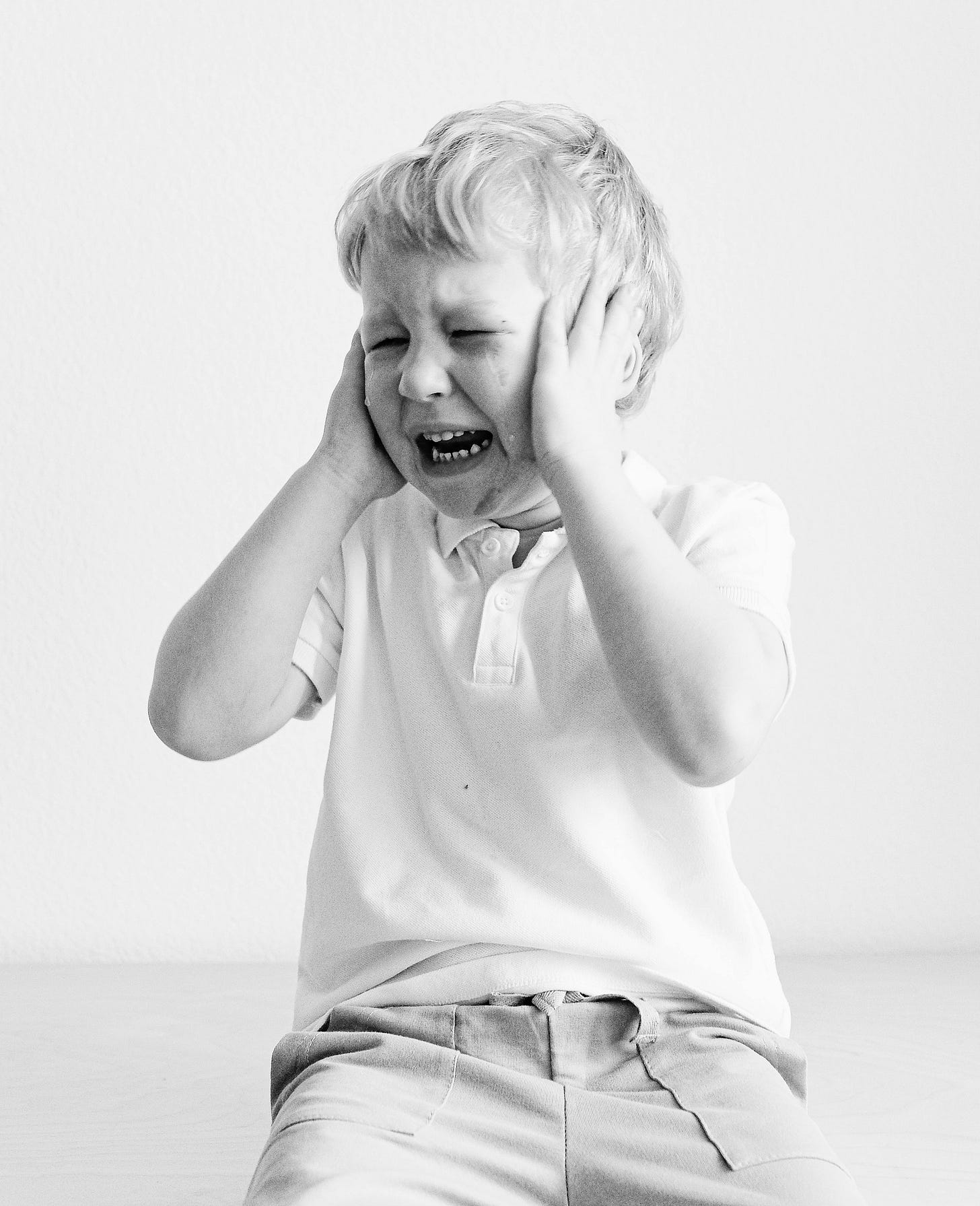"I'm Such an Idiot!" The Surprising Reason You're So Hard on Yourself
Discover the early influences that made you your own worst enemy
Welcome to another edition of Beyond Self Improvement! If you missed it, here’s last week’s article: My Unexpected Relationship With Coffee.
Today’s essay will explore how your past shaped your inner critic and why it’s so hard to silence that negative voice.
If you’re new, consider subscribing below to join our growing community and get the next essay direct to your inbox:
Dear Friend,
How often have you said to yourself, ”You're such an idiot!" after a minor incident?
Perhaps you missed a deadline, forgot an appointment, or were late to meet a friend. Though seemingly innocent, moments like these can unleash a torrent of negative self-talk. Why do we do this to ourselves? Where does this harsh inner critic come from, and why is it so persistent?
Negative self-talk usually stems from deeply rooted feelings of shame, which can be traced back to early childhood experiences. Knowing its origin is crucial to understanding why we are so hard on ourselves and how this negative internal dialogue thrives.
Parental Influence: The Seeds of Shame
Think back to your childhood. Many of us were raised by parents, aunts and uncles, or grandparents who, despite their best intentions, inadvertently passed on their fears, insecurities and unresolved wounds to us. For example, a child who brings home a B on a report card might hear, “You should have gotten an A,” instead of being recognized for their effort.
While intended to motivate, feedback like this often plants seeds of shame and self-doubt. Brené Brown defines shame “as the intensely painful feeling or experience of believing that we are flawed and therefore unworthy of love and belonging—something we’ve experienced, done, or failed to do makes us unworthy of connection.”
Parents often push their children to strive for success, an external pressure that can result in internalized beliefs of inadequacy. When children constantly hear that their best efforts aren't enough, they begin to believe they are insufficient.
Not feeling good enough becomes a core part of their identity, setting the stage for a harsh inner critic.
Reinforcement by Authority Figures
As we grow, other authority figures such as teachers, bosses, and partners often reinforce these feelings of inadequacy. Remember when a teacher embarrassed you in front of the class for a wrong answer or a boss criticized your work during a meeting? These experiences reinforce childhood shame, strengthening the inner critic's voice and making it more persistent.
The pressure to perform in school and the fear of failure can be overwhelming. A single mistake can lead to public humiliation, reinforcing the belief that one must be perfect to be worthy. This mindset often carries into adulthood, where even the most trivial things—from outfits to dinner place settings to how you hold a glass of wine—become a petri dish for perfectionism, failure and self-criticism.
High Personal Standards
We often set exceptionally high standards, striving for a nearly impossible ideal.
This pursuit of perfection is a double-edged sword. While it can drive us to achieve great things, it also sets us up for inevitable disappointment. When we fall short of our high-minded goals, our inner critic takes over, amplifying feelings of failure, inadequacy, and hopelessness.
Imagine setting a goal to run a marathon and training diligently for months. On the marathon day, you twist your ankle at mile twelve (19.31km) and are forced to quit. Instead of acknowledging your hard work and dedication to training, your inner critic might focus solely on failing to look where you were running to avoid the pothole, dismissing all your efforts and achievements up to that point.
Triggering The Inner Critic
The inner critic is that part of our psyche that becomes activated when we perceive ourselves as failing to meet our own or others' expectations.
It is a voice that magnifies our imperfections while overlooking our successes, constantly reminding us of our perceived shortcomings. The inner critic is relentless, often ruminating on past mistakes and worrying about future failures. It tells us we are not intelligent, capable, or worthy enough.
Our inner dialogue is not just a momentary lapse in self-esteem but a deeply ingrained pattern of thinking that affects how we view ourselves and our potential.
Breaking Down Complex Ideas into Simple Parts
1. Parental Influence. Early experiences with parents with high expectations or who were critical can instill a deep sense of shame and inadequacy.
2. Reinforcement by Authority Figures. Criticism from teachers, bosses, and partners reinforces these early feelings of inadequacy.
3. High Personal Standards. Setting unattainably high standards leads to inevitable disappointment and self-criticism.
4. Inner Critic Activation. The inner critic becomes more vocal when we fail to meet expectations, focusing on our failures and dismissing our successes.
These factors don't operate in isolation. They compound over time, reinforcing each other and strengthening the inner critic.
Each critical remark, failure to meet an unrealistic standard, and reinforcement from authority figures adds another layer to the negative self-talk. This compounding effect makes it difficult to break free from the cycle of self-criticism and shame. Understanding why we are so mean to ourselves is the first step towards change.
Freeing Yourself From the Inner Critic
By recognizing the origins of our negative self-talk, you can begin to unravel the deeply rooted patterns of shame and self-criticism.
This path is not about blaming your parents, teachers, or bosses but understanding the influences shaping your inner dialogue.
Imagine a life where your self-talk is supportive and encouraging, where oversights are seen as opportunities for self-understanding and growth rather than proof of your inadequacy.
Change is possible, starting with a deeper understanding of why you are hard on yourself. By shedding light on these origins, you can take the first steps towards a kinder, more compassionate relationship with yourself.
Take a moment to reflect on your self-criticism. Where does it come from? What past experiences have contributed to it? Remember, your inner critic does not define you but rather the deeper voice that knows who you are and always have been.
To learn more, here is an article I wrote about breaking free from self-criticism.
Keep questioning the inner critic,
Ryan
That’s all for this week.
See you next Wednesday.
My biggest passion is working 1:1 with readers like you.
Whenever you’re ready, I can help you stop waging war with yourself and start being your best friend. Schedule a free, 30-minute discovery call now.
P.S. If you found this article helpful, please share it with someone who might benefit from it.




Great story, Ryan!
I'm currently working really hard to let go of self-criticism because I know it doesn't help me.
I make myself and my skills smaller than I am.
I think if we don't consciously remind ourselves to focus on the positive instead of the negative, it's hard to let go of self-criticism because it's so deep rooted in us.
2 things that helped me:
1. Daily affirmations: kind and loving words I'm speaking to myself, which might feel weird, but they make a big difference
2. celebrating small wins: even though you didn't finish the marathon, you should celebrate every small step you took towards it. Every day, getting up running is a bigger achievement than 1 day running a marathon.
Keep questioning the inner critic—what a beautiful article, Ryan. Thank you for sharing your thoughts on this important topic with us. I recently wrote an eBook guide about the inner critic, and it’s great to see others reflecting on self-criticism as well.